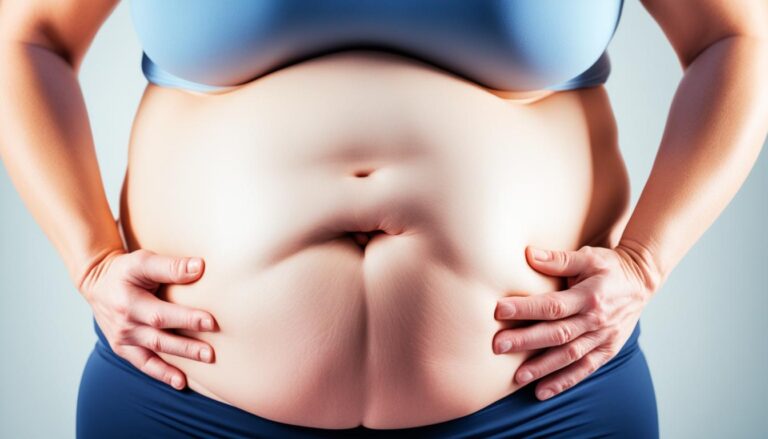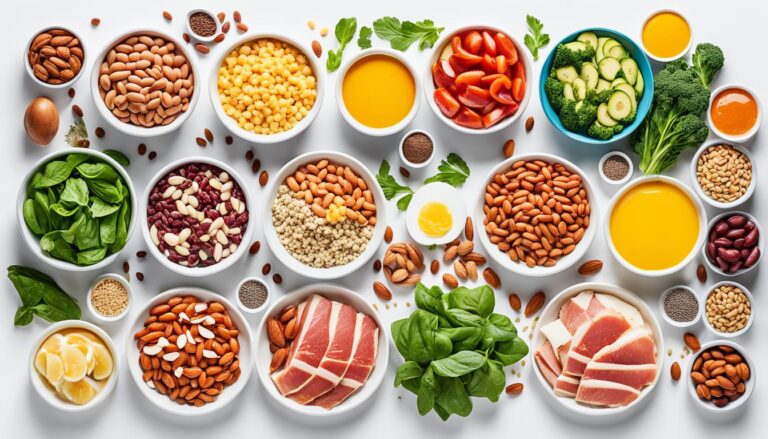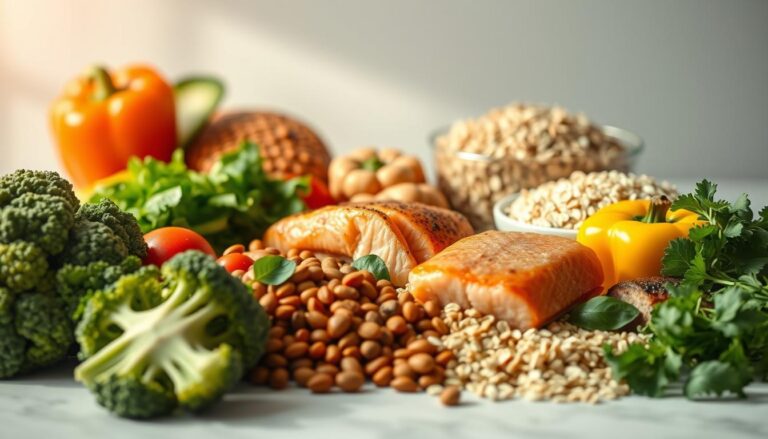Are you feeling weighed down and low on energy? Have detox diets caught your attention as a potential fix? It’s wise to look into what these diets really offer before trying them. They come with both good and bad points for your health.
Key Takeaways
- Detox diets are typically short-term and unsustainable in the long run.
- Potential side effects include low energy, low blood sugar, muscle aches, fatigue, dizziness, and nausea.
- Clean eating, not extreme detox diets, is recommended for maintaining overall health.
- Detox diets may lead to weight gain once a normal diet is resumed.
- There is a lack of scientific evidence supporting the effectiveness of detox diets.
What is a Detox Diet?
A detox diet is a special diet that helps rid the body of toxins. It usually starts with a fast and then focuses on eating only certain foods, like fruits and veggies, as well as drinking lots of water and juices. Some detox plans add supplements herbs or other ways to help the body cleanse.
The main aim is to give the organs a break, help the liver remove toxins, and increase the body’s ways to get rid of those toxins. But remember, our bodies can already get rid of toxins on their own.
Fans of detox diets think they help get rid of bad substances, boost energy, and make you healthier. But experts are not all sure about their benefits because our bodies already have good ways to remove toxins. Some people might see short-term gains, like losing weight or better digestion. Yet, it’s not clear if detox diets really make you healthier in the long run.
Instead it’s better to eat a variety of healthy foods and lead an active life. Foods full of antioxidants fiber, and probiotics are great for you. Also, don’t forget to sleep well, drink plenty of water, and exercise regularly.

Detox diets are a popular way to cleanse the body, but they often lack scientific evidence to support their claims. A balanced, nutrient-rich diet and healthy lifestyle are the best ways to support the body’s natural detoxification processes.
What Do Detox Diets Involve?
Detox diets focus on cutting out certain foods like processed items and red meat. They suggest eating more fruits, vegetables, and whole grains. Drinking lots of water is also key to help your body cleanse itself.
Restricted Food Groups
These diets tell you to drop meat, dairy, and gluten to help cleanse your body. The idea is to give your system a rest from possibly harmful foods. Instead, you eat nutrient-rich foods to help your body clean itself out. Eating enough fiber from veggies nuts, and whole grains is also crucial for detoxing.
Supplements and Cleanses
Detox diets also often use supplements, herbs, and sometimes colon cleanses. Ingredients in liver cleanses might include green tea and milk thistle to detox this vital organ. But, using too many laxatives or doing extreme liquid cleanses is not safe.
Detoxes can last from one day to a few weeks. You might see quick weight loss, but it’s mostly water and stored energy. This weight comes back once you start eating normally. Detox diets can also cause bad nutrient shortages if you do them for a long time8.
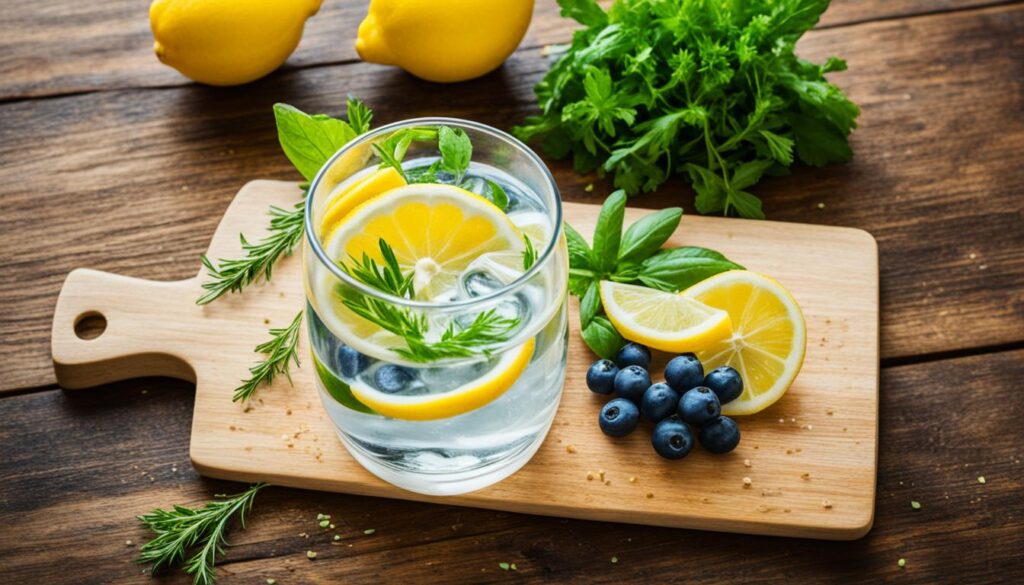
The details of detox diets vary. But, they often include not eating certain things, using supplements, and cleansing techniques to help your body clean itself.
How Do Detox Diets Work?
Detox diets aim to let the body heal and work better by avoiding certain foods or food groups. This is supposed to let the body remove toxins easier and take in more nutrients. They say detox diets give the body a break, help the liver and other organs clean out toxins, and provide key nutrients. However, our bodies are already good at getting rid of harmful stuff using organs like the liver and kidneys.
Claimed Mechanisms
Some detox diets say they work by removing toxins, getting organs to work better, calming inflammation, and helping the body soak up more nutrients. These diets often tell people to avoid processed foods, dairy gluten eggs peanuts, and meat.
Instead, they push for eating organic veggies, fruit, grains without gluten, nuts, seeds, and healthy proteins. But, there’s little science to back up these claims, and not eating could slow down the body’s natural cleanup process.
Also, detox supplements and herbal mixes don’t have strong oversight for quality and safety. This can be risky because these products may contain stuff that’s not good for you. Since the FDA doesn’t check these detox products, it’s easier for harmful ones to end up on the market.

Though some studies have linked detox diets to losing weight, lower insulin resistance, and better blood pressure, more proof is needed. Drinking too much water can wash out important electrolytes, and lots of green tea can cause problems like heart rhythm issues, trouble sleeping, and harm to the liver.
Experts still don’t fully understand how detox diets bring these good effects. Plus, there’s not a lot of solid evidence to support their claim. Doctors warn against trying detox diets without medical advice. They say it’s better to deal with health problems at the root and get professional health guidance before jumping into any detox plan.
Potential Benefits of Detox Diets
Detox diets are not fully backed by science to remove toxins from your body. Still, they can help you lose some weight quickly. They can also cut your cravings for sweets and help you stop bad eating habits. Eating mainly whole, rich foods during a detox might help your body soak up nutrients better and boost your health.
Detox plans make you pay closer attention to what and how you eat. This can make you more aware of certain foods that might not agree with you.
But keep in mind, these benefits aren’t just from detox diets. A good, balanced diet and lifestyle can do the same thing. Some foods like coriander, nori, and olestra show some detoxing effects in animals. But, we need more studies to know if they work the same for people.
| Potential Benefit | Description |
|---|---|
| Weight Loss | Detox diets may facilitate modest short term weight loss, primarily due to the restricted calorie intake and elimination of certain food groups. |
| Reduced Sugar Cravings | The focus on whole nutrient dense foods during a detox diet can help reduce cravings for sugary and processed foods. |
| Healthy Eating Habits | Detox diets can provide a reset period, allowing individuals to break away from unhealthy eating patterns and develop a more mindful approach to nutrition. |
| Nutrient Absorption | The emphasis on consuming more whole, nutrient-dense foods during a detox diet may improve overall nutrient absorption and support better health. |
| Food Sensitivity Identification | The structured nature of detox diets can help individuals identify potential food sensitivities or intolerances, leading to a more personalized approach to healthy eating. |
The potential perks of detox diets are interesting. Yet, it’s vital to be careful and see them from every angle. Detoxing is not straightforward and varies for each person. Also, many detox products or plans lack strong scientific backing. Always talk to a health expert before starting a detox. This ensures it fits your health goals in a safe way.
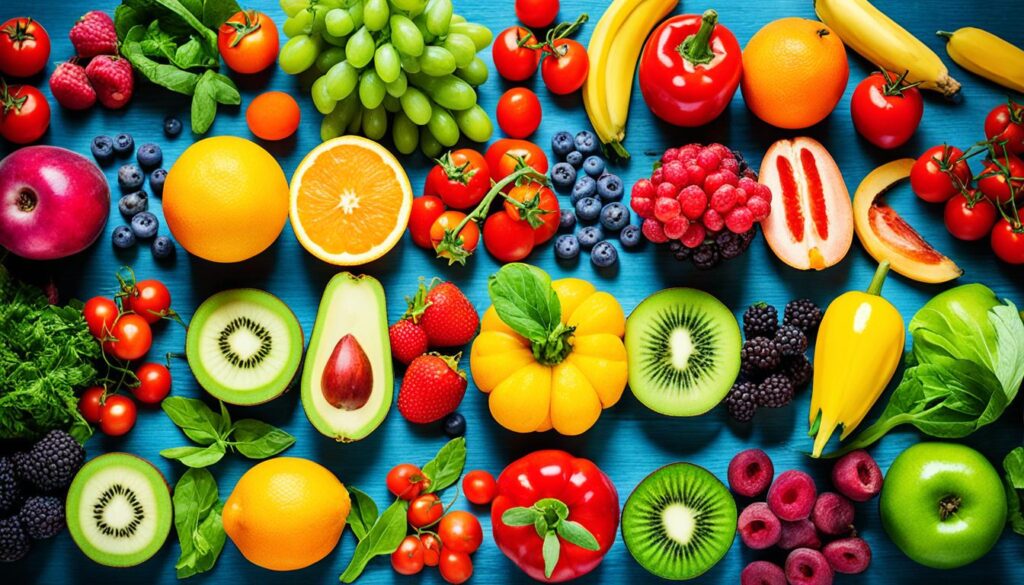
Risks and Side Effects of Detox Diets
Detox diets get a lot of praise for their supposed health benefits, but they come with significant risks. These diets usually mean eating way fewer calories and drinking a lot more water. There have only been a few studies on detox diets. The ones we have found often have biased or weak designs. Though you might lose some weight at first, detox and low-calorie diets do more harm than good in the long term.
Low Calorie Intake
Eating very few calories and not enough nutrients can cause a lot of issues. These include low energy, dizziness, muscle pains, and feeling sick. You might also miss out on essential nutrients like protein and vitamins. This could hurt your health over time. It’s much better for your body to make small, steady changes to what you eat and how you live for lasting health.
Dehydration and Electrolyte Imbalance
If your detox diet involves laxatives or enemas, it can mess up your body’s fluids and nutrients. These diets may make it seem like you’re losing weight when really it’s just water. A diet high in water can also be harmful, leading to a condition called water intoxication. Some detox products have dangerous stuff in them, like bacteria or dehydrating laxatives.
In the end, the bad things about detox diets are often more than the potential good. They could even harm your mental health making you feel bad about food or causing eating disorders.
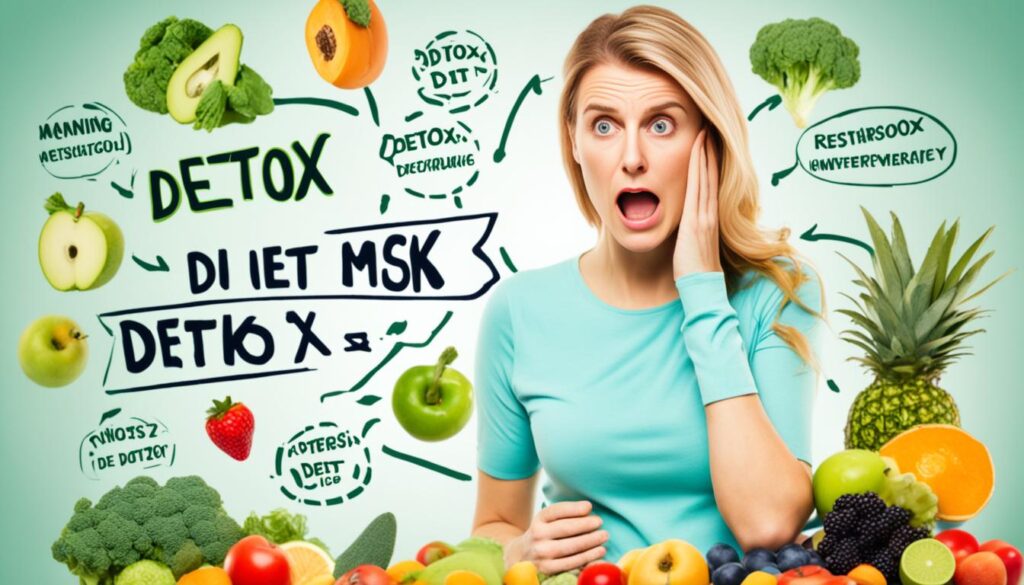
Gradual, sustainable changes to diet and lifestyle are recommended over quick fix detox diets for long-term health benefits.
Do Detox Diets Aid Weight Loss?
The idea that detox diets help lose weight is often too hopeful. Most often, when someone loses weight quickly on a detox diet, they’re losing water and stored carbs, not actual fat. This means that the weight comes back fast once they stop the detox. These diets don’t help with the real reasons why people gain weight.
Many detox diets have you eat very few calories and cut out important nutrients. This can slow down your metabolism over time, making it harder to lose weight and keep it off. So, any weight you lose on a detox diet is likely to come back, and these diets aren’t a good long-term weight loss strategy.
- A study in Frontiers in Nutrition from 2022 shows that detox diets can increase stress make you more likely to binge eat, and could lead to gaining even more weight.
- Losing weight by eating fewer calories on a detox diet might work for a while, especially if you also exercise.
Ultimately, detox diets might make you feel good for a little while, but they don’t deal with the reasons behind weight gain. A better way to manage your weight for the long term and be healthy is through balanced eating and regular exercise.
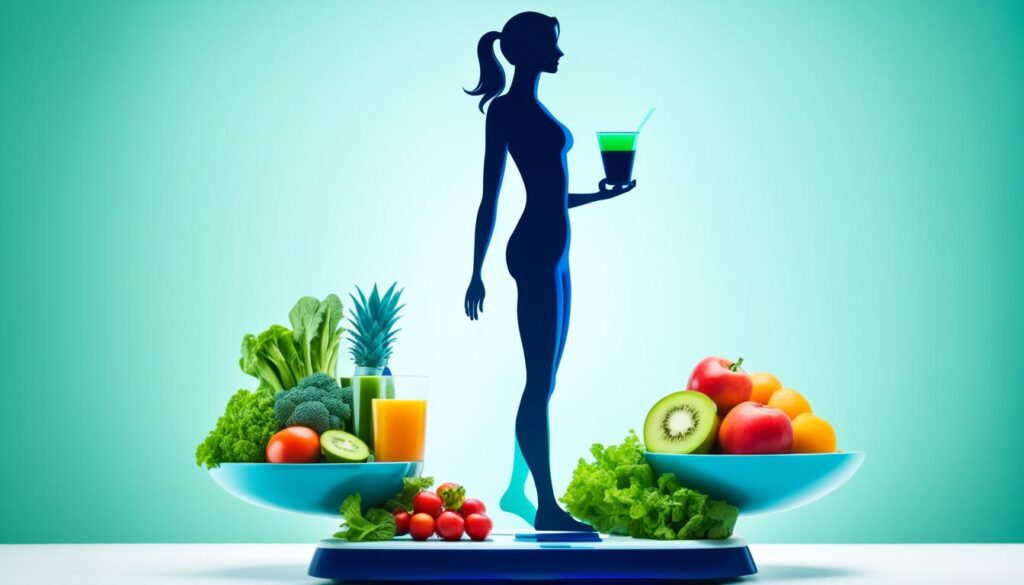
Detox diets may help lose a bit of weight fast, but it usually comes back.
So, in the end, detox diets don’t offer a long-term solution. They might have temporary benefits, but they often come with risks like a slower metabolism, dehydration, and imbalanced electrolytes. Focus on a well-rounded diet and staying active. This is the healthiest way to manage your weight over time.
Detox Diets and Short term Fasting
Many believe detox diets and short-term fasting are quite similar. Supporters suggest detox diets erase toxins and boost health. But, doctors like Thomas W. Hopkins and Toni J. Brayer argue our body already detoxes well on its own.
Studies show benefits of short fasts, like better insulin and leptin response, are not just from detox diets. They can be gained through steady diet and lifestyle choices. Yet, detox diets are not for everyone. They might cause stress and overeating in some people.
A one-day fast might make you feel good. But going without food for more than three days could hurt, especially if you have health issues. Dr. Brayer notes no solid proof backs up the benefits of cleanses or fasts. Such extreme diets can cause nutrition shortages, harming your health.
Short fasts can lead to some good health outcomes. But, it’s important to turn healthy habits into a lifestyle to really benefit. This includes drinking enough water, eating natural foods, staying active, reducing stress, and sleeping well.
While brief cleanses might help start these habits and drop some weight, long fasts can make the body think it’s being starved. This may slow down metabolism and impact future diet success.
In summary, some detox diets might match the effects of fasting. Still, the true benefits of these practices aren’t solely detox related. Our body naturally does well in cleaning itself. The key is a balanced lifestyle for full support of natural cleansing.
Are Detox Diets Safe for Everyone?
Detox diets are often seen as a good way to purify the body. But, they might not be safe for all. Some people, especially those at higher risk, should be very careful. They might even need to stay away from these strict diets.
At-Risk Groups
Teens and the elderly might face more dangers from detox diets. Teens are still growing, and these diets can mess that up. They might not get enough nutrients and thus not grow properly. The same goes for the elderly. Their nutritional needs are harder to meet with these diets, risking their health.
Doing detox diets is not safe for pregnant or nursing mothers. It’s also risky for those with health issues like diabetes. They should talk to a doctor before trying these diets. Lack of nutrients can really hurt both the mother and the baby’s health.
People fighting eating disorders face big dangers with detox diets. These diets can make their condition worse.
If you are in any of these risky groups, you must seek medical advice first. A doctor can check if it’s safe for you. They can also help with any health problems detox diets might cause.
Detox diets are not a one size-fits-all solution, and certain groups may face significant risks to their health and wellbeing by following these restrictive regimens.
Detox diets are not for everyone. It’s important to know the dangers and talk to a doctor. They can suggest safer ways to help your body clean itself.
Debunking Detox Diet Claims
Detox diets claim they can remove toxins from our bodies. But science doesn’t back this up. Our bodies naturally cleanse through organs like the liver and kidneys. They turn harmful stuff into safe things, which we then get rid of when we pee, poo, or sweat. Yet, some toxins may stay, like some chemicals and metals, even as we eat these detox diets.
These diets also promise more energy, weight loss, and better organ health. These changes may happen because we cut out junk foods and eat more natural, healthy stuff. Still it’s not clear if these diets really do what they claim. Studies have not proven their effects.
Marketing plays a big role in why detox diets are so popular, not solid science. Just searching Detox Diets on Google brings up millions of hits. Many people have tried juice cleanses, which might not be the best for health and can be expensive.
Instead of costly detox diets, focusing on what we eat and how active we are can be much more beneficial. A diet full of fibers from fruits, veggies grains, and more can boost how our body naturally cleans itself19. Staying hydrated and getting good sleep are also key to feeling well.
No specific study has been cited to demonstrate the health benefits of detox diets on outcomes such as weight loss.
So, it’s best to be careful with detox diets since they lack real proof. A healthy diet and lifestyle really support our body’s natural cleaning. These are the true ways to help our bodies clean and stay well.
A Balanced Approach to Cleansing
Choosing a balanced approach to cleansing is better than risky detox diets. To enhance health, it’s smart to eat foods full of nutrients. Think of fruits, veggies, lean meats, and whole grains as your friends. Try to avoid overly processed fatty, and sugary foods. Also, remember that moving, drinking water, and sleeping well help your body cleanse itself.
Instead of quick-fix detox diets, aim for gradual, sustainable changes. This way, you’ll naturally clear out toxins and feel better. Detox diets might sound good, but eating healthily every day and staying active is far better.
Detox diets hype doesn’t always line up with science. A true balanced diet is key. Include lots of veggies, fruits, whole grains, lean meats, nuts, dairy, and good fats in your meals. This mix is best for your health.
The best detox is a sustainable, long-term approach to health.
Adopting a balanced cleansing approach is positive in every way. Not only is it safe, but it also works long-term. Do it with friendly foods, movement, water, and sleep for the win. This is a winning recipe for a healthy life.
Conclusion
While detoxing sounds great, there isn’t much scientific proof for detox diets. Our bodies already work hard to get rid of toxins using our liver, kidneys, and more. Instead of doing risky detox diets, it’s smarter to eat well drink water exercise, and make other healthy choices.
Detox diets say they help clean toxins and lose weight without solid proof. Some can even be bad because they cut out many foods which can cause health problems. The good effects people talk about from detox diets are usually just the result of eating less and drinking more water, not the diet itself.
Don’t believe all the hype about detox diets. It’s better to take a balanced lasting, and evidence-based step in supporting our body’s natural ways to detox. This means eating foods that are good for us, drinking enough water, working out, and other choices that help us stay healthy. There’s a safer and smarter way to help our body clean itself, and it doesn’t involve harmful detox diets.



